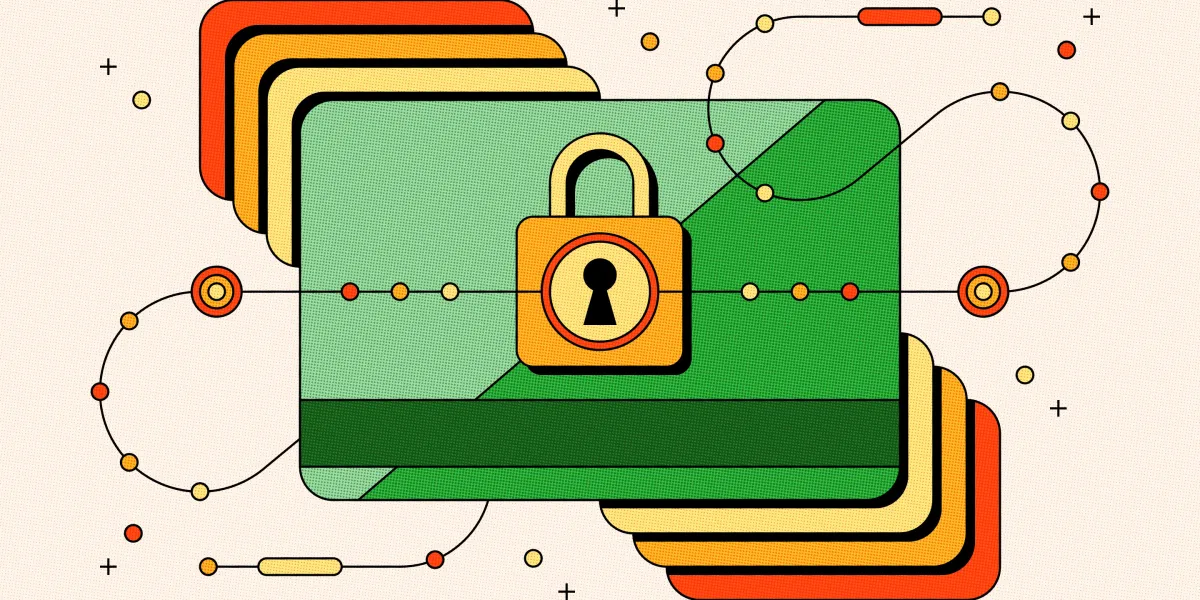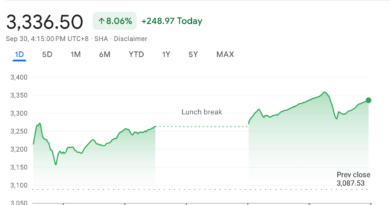8 best secured credit cards to help build or repair your credit
Secured credit cards are a type of credit card that have a lower barrier to entry because they require the cardholder to pay a security deposit that guarantees their line of credit. Because your lender has a financial cushion to fall back on in case you fail to make payments on your credit card, these credit cards usually have more lenient approval requirements.
If you aren’t looking to build credit but just need a plastic way to pay, a prepaid debit card might be a better fit.
_______________
The best secured credit cards of July 2024
_______________
Chime Credit Builder Secured Visa® Credit Card
The Chime Credit Builder Secured Visa® Credit Card earned a spot on our list for having no minimum security deposit**, no annual fee, and no interest APR.*
FEATURED PARTNER
Chime Credit Builder Secured Visa® Credit Card
Who is this card good for?
The Chime Credit Builder Visa card is good for those who don’t want to be bound by minimum deposits.
| Annual fee | None |
| APR | None |
| Security deposit | $0 |

Our Take: If you’re working on repairing your credit, this card doesn’t have strict approval requirements. In fact, Chime® doesn’t require a credit check to apply, which means there won’t be a hard inquiry on your credit report. Chime also reports your on-time payments to all three major credit bureaus.
To learn more, see our Chime Card review.
Capital One Platinum Secured Credit Card
Capital One’s Platinum Secured Credit Card made our list for its relatively low minimum deposit and zero-dollar annual fee.
Capital One Platinum Secured
Who is this card good for?
The Capital One Secured card is good for those who are okay with a lower credit limit.
| Annual fee | $0 |
| APR | 30.74% Variable |
| Security deposit | $49, $99 or $200 |

Our take: Users can raise their initial credit line by depositing more than the minimum amount, but only up to $1,000 maximum. For users who are looking for a little more spending power, this card may not be the best option. But, if you use the card responsibly, you could get your deposit back and become eligible to upgrade to an unsecured credit card.
Capital One Quicksilver Secured Cash Rewards Credit Card
If you want a secured card that earns rewards and lacks hidden fees, the Quicksilver Secured could be for you.
Capital One Quicksilver Secured Cash Rewards Credit Card
Who is this card good for?
The Capital One Quicksilver Secured card is good for those who are rebuilding from poor or fair credit and want a card that earns rewards with no foreign transaction fee.
| Annual fee | $0 |
| APR | 29.99% variable |
| Security deposit | $200–$1,000 to $3,000 (depending on your creditworthiness) |

Our take: Capital One’s Quicksilver Secured Cash Rewards Credit Card carries a steep APR, so it’s important that you be diligent about making on-time payments. The upside: consumers have the opportunity to boost their spending power by making more than the minimum security deposit. Plus, this card doesn’t come with any foreign transaction fees, replacement card fees, or authorized user fees.
Bank of America® Customized Cash Rewards Credit Card
Bank of America’s Customized Cash Rewards Secured Credit Card earned a spot on our list for its zero-dollar annual fee, high credit limit, and rewards structure.
Bank of America® Customized Cash Rewards Secured Credit Card
Who is this card good for?
The Bank of America Customized Cash Rewards Secured card is good for those who want a low annual fee and extensive rewards.
| Annual fee | $0 |
| APR | 28.24% Variable |
| Security deposit | $200–$5,000 |
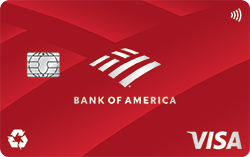
Our take: The Customized Cash card gives cardholders the opportunity to choose how you want to earn rewards. You can earn 3% on the category of your choice, 2% cash back at grocery stores and wholesale club purchases, and 1% unlimited cash back on all other purchases. You can also access your FICO® Score for free, which is updated monthly, online or within your mobile banking app.
BankAmericard® Secured Credit Card
The BankAmericard® Secured Credit Card has one of the highest possible credit limits on our list and doesn’t charge an annual fee.
BankAmericard Secured Credit Card
Who is this card good for?
The BankAmiercard Secured card is good for those who aren’t interested in the rewards game.
| Annual fee | $0 |
| APR | 28.24% Variable |
| Security deposit | $200–$5,000 |
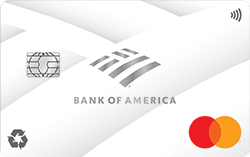
Our take: You do trade something for the high possible limit: you won’t earn any rewards while using this card, so you won’t get to cash in on extra perks like cashback or rewards points. However, this card does come with other redeeming benefits like overdraft protection, free FICO scores, contactless chip technology, and more.
Discover It® Secured Card
The Discover It® Secured Card made our list for its zero-dollar annual fee and higher credit limit compared to some of the other credit cards on our list.
Discover it Secured Card
Who is this card good for?
The Discover it Secured card is good for those who value extra security perks.
| Annual fee | $0 |
| APR | 28.24% Variable |
| Security deposit | $200–$2,500 |
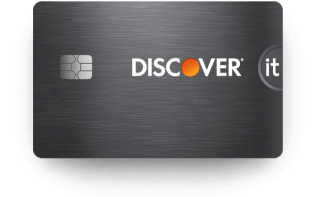
Our take: The APR on the Discover it Secured credit card is on the higher end, but it does have an important added perk: a long list of security features. These features include online privacy protection that removes your personal information from websites that may sell your data, free Social Security number (SSN) alerts that will notify you if your SSN is found on the dark web, $0 fraud liability guarantee, and more.
UNITY Visa® Secured Credit Card
The UNITY secured card has one of the lowest interest rates we surveyed along with the ability to secure one of the highest credit limits.
UNITY Visa® Secured Credit Card
Who is this card good for?
The UNITY Visa Secured card is good for those who don’t mind a higher annual fee for a higher credit limit.
| Annual fee | $39 |
| APR | 17.99% |
| Security deposit | $300–$10,000 |

Our take: The UNITY Visa® Secured Credit Card was the only credit card on our list that charged an annual fee. At $39, it’s still significantly lower than other, unsecured cards, but this is an expense to be aware of nonetheless. However, if you can look past the annual fee, this card offers the highest possible credit limit at $10,000 and a fixed rate APR which means that you get to avoid the uncertainty of fluctuating APRs in a high-inflation environment.
Credit One Bank® Secured Card
The Credit One Bank® Secured Card took the final spot on our list for its rewards structure and interest-earning security deposit.
Credit One Secured Card
Who is this card good for?
The Credit One Secured card is good for those who don’t need a high credit limit.
| Annual fee | $0 |
| APR | 29.24% |
| Security deposit | $200–$300 |
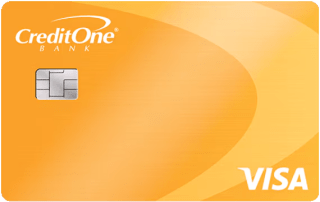
Our take: Cardholders can earn 1% cash back on gas and groceries as well as your monthly mobile phone, internet, cable, and satellite TV services. Bonus: your security deposit account also earns a competitive interest rate. This card does have a lower maximum credit limit compared to the other options on our list, but for new-to-credit consumers, this may be an option worth considering.
What is a secured credit card?
Think of a secured credit card as a credit card with training wheels that help you build up your credit score. Here’s how it works: when you get a secured card, you have to put down a cash deposit first. That deposit sets your credit limit—so if you deposit $500, that’s how much you can spend on the card.
Why the deposit? It’s like insurance for the bank. It shows them you’re serious and gives them something to fall back on if you can’t make a payment. But here’s the incentive: you can get that deposit back when you close your account or upgrade to a regular credit card.
Secured cards are perfect if you’re new to credit or if you’ve had some bumps in the road on your financial journey. They give you a chance to prove you can handle credit responsibly without risking getting into too much debt. Plus, using a secured card wisely—making payments on time and not maxing it out—can really help boost your credit score over time.
However, not all secured cards are created equal. Some may have fees, like an annual fee, or slightly higher interest rates compared to other cards. That said, if you use your secured card smartly and build good credit habits, you’ll be setting yourself up for more financial opportunities down the line.
So, whether you’re just starting to explore credit cards or looking to rebuild your credit history, a secured credit card could be a smart move. It’s a practical tool that helps you build a solid credit foundation. Just remember, it’s all about using it responsibly and learning how to manage your money wisely.
Understanding how secured credit cards work and their benefits can really give you a leg up in managing your finances. Whether you’re aiming to establish credit for the first time or bounce back from past setbacks, a secured card is a friendly starting point in the game of life.
What is the difference between a secured credit card and an unsecured credit card?
When you’re thinking about whether to go for a secured or unsecured credit card, it really comes down to understanding how each one works and what they mean for your wallet. Secured credit cards kick off with you putting down a cash deposit upfront, which then sets your spending limit. This deposit makes the bank feel safer because they’ve got something to cover them if you miss a payment. It’s a way to show that you’re serious about handling credit responsibly. Plus, if you play your cards right—paying on time and keeping your spending in check—you can start boosting your credit score. And here’s the perk: down the road, you might even get that deposit back or move up to an unsecured card.
On the flip side, unsecured credit cards don’t need any upfront cash. They’re based more on your credit history, income, and other financial stuff. You usually get more flexibility with these cards, like higher spending limits and maybe even rewards like cash back or points that fit your spending habits.
Choosing between secured and unsecured cards really depends on where you’re at financially and what you’re aiming for. If you’re starting from scratch or working to rebuild your credit, a secured card can be a solid stepping stone. It gives you a structured way to learn the ropes of credit and build up good money habits. On the other hand, if you’ve already got a decent credit history and want more perks and power with your spending, an unsecured card might be more your speed.
Now, when you’re comparing these cards, keep an eye on the fees and interest rates. Secured cards might have higher fees or interest rates because they’re seen as a bit riskier for the bank. But if you manage it right, those costs can be worth it as you work on improving your credit over time. Unsecured cards generally come with lower interest rates and fees if your credit’s in good shape. Just watch out for penalties if you’re late on payments or go over your credit limit.
Both types of cards have their pros and cons depending on what you need. Secured cards are great for building credit, while unsecured cards offer more perks if your credit’s already solid. Understanding these differences and how they match up with your money goals is key to picking the right card.
By weighing up the good and bad of secured versus unsecured credit cards and fitting them to your financial goals, you’re making a smart move toward better financial health. Whether you’re starting out with credit, looking to boost your score, or aiming to score big rewards, picking the right card sets you on the right path to managing your money smartly.
Can I upgrade from a secured to an unsecured credit card?
Yes, many issuers allow cardholders to upgrade from a secured to an unsecured credit card after demonstrating responsible credit behavior. This typically involves maintaining a positive payment history, keeping balances low relative to your credit limit, and showing improved creditworthiness over time. The issuer may review your credit report and financial situation before approving the upgrade. Moving to an unsecured card can provide higher credit limits, lower fees, and additional benefits like rewards programs or introductory APR offers.
What to know about secured card deposit?
From how much to deposit to how long it needs to stay in the bank, there are a lot of questions about secured card deposits. Here’s what you need to know:
How much should I deposit for a secured credit card?
Deposit requirements for secured credit cards vary depending on the issuer and your credit profile. Typically, deposits range from $200 to $500, but some issuers may require more depending on your creditworthiness and the card’s terms. It’s important to choose a deposit amount that fits comfortably within your budget and allows you to manage your spending responsibly. Remember, your deposit amount becomes your credit limit, so it directly impacts how much you can spend with the card.
Can I get my deposit back from a secured credit card?
Yes, you can typically get your deposit back from a secured credit card. When you close your secured card account in good standing—meaning you’ve paid off any remaining balance and haven’t missed payments—the issuer will usually refund your deposit. In some cases, issuers may even automatically convert your secured card to an unsecured card after you’ve demonstrated responsible use over a period of time. This conversion allows you to maintain your credit history and potentially receive your deposit back without closing the account.
How long should I keep a secured credit card?
You should keep a secured credit card as long as it continues to serve your financial goals and helps you build or maintain a positive credit history. Many people keep their secured card until they have established enough credit history and improved their credit score to qualify for an unsecured credit card or other financial products with better terms. Closing a secured credit card account can affect your credit score, particularly if it’s one of your older accounts. Consider keeping the account open if it’s helping you achieve your credit goals and providing valuable credit-building opportunities.
Pros and Cons of secured credit cards
Pros
- Can help you (re)build credit in as little as two months
- Some issuers may allow you to “graduate” into an unsecured card after some time
- Your deposit is refundable—so long as you repay your balance
- Easier to qualify for those who struggle with credit
Cons
- Requires an upfront cash deposit that will inform your credit limit
- May charge you high fees and interest charges if you fail to make payments on time
- Has a low credit limit compared to unsecured cards
- Typically carries higher APRs
How to choose a secured credit card
There are many different factors you’ll want to consider when choosing a secured credit card. Some of the key information you should make sure to know about each card includes:
- APR: If you have a hard time making on-time payments, you’ll want to know how that could impact you as far as interest payments are concerned. A higher APR means that you’ll pay more in interest over time if you carry a balance.
- Annual fee: Many of the cards on our list do not charge an annual fee, but there are secured cards that do charge an annual fee for added perks or services. Make sure to weigh whether or not this extra cost is worth it to you.
- Security deposit: Your security deposit is how much you need to pay your issuer at the start. This amount serves as your initial credit limit. While there are cards that offer opportunities to upgrade to an unsecured card or that may offer you a credit limit increase depending on your creditworthiness, it’s important to know how much you’ll need to get started and what that means for your spending power—at least in the short-term.
- Reporting to credit bureaus: If the purpose of your secured card is to build or repair your credit, it’s crucial that the card and issuer you choose report your payment history to all three major credit reporting agencies (Experian, Equifax, and TransUnion)—that way you can get credit for your positive money habits and improve your credit score.
How to apply for a secured credit card in ten steps
Applying for a secured credit card is a straightforward process that can help you build or rebuild your credit history. Whether you’re new to credit or looking to improve your credit score, a secured card can be a valuable tool. Here’s how to get started:
1. Research Secured Credit Cards: Begin by researching different secured credit card options available from various banks and credit unions. Look for cards that offer reasonable terms, such as low annual fees and competitive interest rates. Consider reading reviews or asking friends and family for recommendations to find a card that suits your financial needs.
2. Check Eligibility Requirements: Each secured credit card issuer has specific eligibility requirements. Typically, you’ll need to be at least 18 years old and have a verifiable source of income. Some issuers may also require a U.S. Social Security Number or Individual Taxpayer Identification Number (ITIN). Ensure you meet these criteria before applying.
3. Gather Required Documents: Before applying, gather necessary documents such as your identification (driver’s license, passport), proof of income (pay stubs, tax returns), and your Social Security Number or ITIN. Having these documents ready will streamline the application process.
4. Compare Fees and Terms: Carefully review the fees and terms associated with each secured credit card option. Common fees include annual fees, application fees, and potentially higher interest rates compared to unsecured cards. Understanding these costs upfront will help you choose the most affordable option for your budget.
5. Apply Online or In Person: Once you’ve chosen a secured credit card that meets your needs, you can apply online or visit a branch in person. The application will ask for personal information, employment details, and your desired deposit amount. Be honest and accurate when filling out the application to avoid delays or rejection.
6. Make a Deposit: One unique aspect of secured credit cards is the deposit requirement. You’ll need to make an initial cash deposit, which typically determines your credit limit. Deposits commonly range from $200 to $500, but this amount can vary based on the issuer and your credit profile. Remember, this deposit acts as collateral and is refundable when you close your account or upgrade to an unsecured card.
7. Activate Your Card: Once your application is approved and you’ve made your deposit, you’ll receive your secured credit card in the mail. Activate it promptly by following the issuer’s instructions, typically by calling a specified phone number or logging into your account online. Activation is necessary before you can start using the card for purchases.
8. Use Your Card Responsibly: After activating your secured credit card, use it responsibly to build or rebuild your credit. Make small purchases that you can pay off in full each month to avoid interest charges. Aim to keep your credit utilization—the ratio of your balance to your credit limit—below 30%. Pay your bill on time every month to establish a positive payment history.
9. Monitor Your Credit Progress: Regularly check your credit report and credit score to track your progress. As you use your secured card responsibly, you should see improvements in your credit score over time. This progress can open doors to better financial opportunities, such as qualifying for an unsecured credit card or securing lower interest rates on loans.
10. Consider Graduating to an Unsecured Card: Once you’ve built a positive credit history with your secured card—typically after 12 to 18 months—consider applying for an unsecured credit card with the same issuer. Many issuers offer options to transition from secured to unsecured cards based on your credit performance. This transition may allow you to receive your deposit back and enjoy higher credit limits and additional card benefits.
Applying for a secured credit card is a proactive step toward building your financial future. By choosing the right card, making timely payments, and managing your credit responsibly, you can lay the groundwork for a solid credit history and improved financial well-being.
How does a secured credit card help you build credit?
Secured credit cards serve as valuable tools for building or rebuilding credit. They are specifically designed for individuals who have limited credit history or have encountered difficulties managing credit in the past. Here’s how secured cards work to help you establish a positive credit history:
Secured credit cards require you to make an initial cash deposit, which serves as collateral and determines your credit limit. This deposit reduces the risk for the card issuer, making it easier for people with less-than-perfect credit to qualify. The amount of your deposit typically ranges from $200 to $500 or more, depending on the issuer and your creditworthiness.
Once you’re approved for a secured card and make your deposit, you can use the card just like a regular credit card. You can make purchases, pay bills, and manage your day-to-day expenses. The key to building credit with a secured card lies in using it responsibly:
- Payment History: Your payment history is the most crucial factor in building credit. Make sure to pay your secured card bill on time every month. Timely payments demonstrate to creditors that you can manage credit responsibly and contribute positively to your credit score.
- Credit Utilization: Another important factor is your credit utilization ratio, which is the amount of credit you’re using compared to your credit limit. It’s recommended to keep your credit utilization below 30%—for example, if your credit limit is $500, try to keep your balance below $150 each month.
- Credit Reporting: Secured cards report your payment history and credit utilization to the major credit bureaus (Experian, TransUnion, Equifax). This reporting helps establish a positive credit history if you consistently make on-time payments and keep your balances low.
- Credit Score Improvement: As you use your secured card responsibly over time, you’ll likely see improvements in your credit score. Building a positive credit history demonstrates to lenders that you are a reliable borrower and can lead to better credit offers in the future.
Secured cards also provide an opportunity to learn good financial habits. By budgeting your spending and paying off your balance each month, you develop discipline and avoid accruing unnecessary debt. Many secured card issuers offer tools and resources to help you track your spending and manage your payments effectively.
Moreover, secured cards can be a stepping stone to obtaining an unsecured credit card. After demonstrating responsible credit behavior over a period of time—usually six months to a year—some issuers may offer to transition your secured card to an unsecured card. This transition often includes returning your deposit and providing you with a higher credit limit based on your improved credit profile.
In summary, secured credit cards are accessible tools for building credit, especially if you have a limited credit history or bad credit. By making on-time payments, keeping balances low, and using credit responsibly, you can establish a positive credit history and improve your credit score over time. Secured cards not only help you build credit but also empower you to manage your finances wisely and prepare for future financial goals.
A case study in how a secured credit card works
Meet Sarah, a college graduate who recently started her first job. Like many young adults, Sarah didn’t have much of a credit history. She wanted to build credit responsibly, so she decided to apply for a secured credit card.
Sarah chose a secured card that required a $300 deposit, which became her credit limit. This allowed her to start small and manageable while learning how to use credit wisely. She used her secured card for everyday expenses like groceries and gas, making sure to pay off the balance in full each month to avoid interest charges.
Over the first six months, Sarah focused on establishing a positive credit history. She made all her payments on time and kept her credit utilization low, typically below 30% of her credit limit. She found the online banking tools provided by her card issuer helpful for tracking her spending and managing her payments.
By the end of the first year, Sarah noticed improvements in her credit score. The responsible use of her secured card had boosted her creditworthiness, making her eligible for better financial products. Encouraged by her progress, Sarah decided to apply for an unsecured credit card with her bank.
Thanks to her improved credit score and solid payment history, Sarah was approved for an unsecured card with a higher credit limit and no annual fee. She continued to use her secured card occasionally to maintain its positive impact on her credit history while enjoying the benefits of her new unsecured card, such as cashback rewards on her purchases.
Sarah’s case illustrates how a secured credit card can be a valuable stepping stone to establishing and improving credit. Through careful management and responsible use, Sarah not only built her credit score but also gained confidence in managing her finances effectively. Secured credit cards offer a practical way for individuals with limited credit history or past credit challenges to pave the way toward financial stability and future financial opportunities.
Can you get a secured credit card with bad credit?
Secured credit cards are indeed available for individuals with bad credit. These cards are specifically designed to help people with limited credit history or poor credit scores build or rebuild their credit. The key feature of a secured credit card is that it requires a cash deposit upfront, which acts as collateral and determines your credit limit.
When applying for a secured credit card with bad credit, you’ll need to find a card issuer that offers these specific cards. Many banks and credit unions provide secured card options, each with varying terms, fees, and deposit requirements. Despite your credit history, secured cards are accessible because the deposit reduces the risk for the card issuer, making them a viable option even after financial setbacks.
Can anyone get approved for a secured card?
Secured credit cards are designed to be accessible to most individuals, including those with limited credit history or past credit issues. Because the deposit reduces the risk for the issuer, secured cards are often easier to qualify for compared to unsecured cards. However, you still need to meet the issuer’s criteria, which may include having a steady income, being of legal age to enter into a credit agreement, and having the ability to make payments on the card. Meeting these requirements demonstrates your ability to handle credit responsibly and may improve your chances of approval.
Before applying, it’s essential to consider several factors. First, check the eligibility requirements set by the issuer, which typically include being at least 18 years old, having a verifiable source of income, and providing a Social Security Number or Individual Taxpayer Identification Number (ITIN).
Secondly, determine the amount you can comfortably deposit, as this will determine your initial credit limit. Deposits generally range from $200 to $500, but some issuers may require more depending on your creditworthiness. Choose an amount that fits your budget and allows you to manage your spending responsibly.
Additionally, review the card’s terms and conditions carefully, especially regarding fees. Secured credit cards may come with annual fees, application fees, or higher interest rates compared to unsecured cards. But there are also cards—including most on our best secured cards list—that have no extra fees. Understanding these costs upfront will help you select a card that aligns with your financial situation.
Once approved and after making your deposit, use your secured credit card responsibly. Make small purchases that you can pay off in full each month to demonstrate responsible credit management. Aim to keep your credit utilization—the percentage of your credit limit used—low, ideally below 30%.
Will using a secured credit card affect my credit score?
Yes, using a secured credit card responsibly can positively impact your credit score over time. Payment history and credit utilization are significant factors in determining your credit score. By making timely payments and keeping your balances low relative to your credit limit, you demonstrate responsible credit management. These positive actions are reported to the credit bureaus and can contribute to building a positive credit history.
As your credit history improves, your credit score may increase, making you more attractive to lenders for future credit opportunities. But beware that using a secured card irresponsibly could negatively impact your credit as well. If you miss a payment, your score will go down and it could take months or even years to recover.
By making on-time payments and keeping balances low, you establish a positive payment history and improve your creditworthiness. Regularly monitor your credit report to track your progress and ensure accuracy.
To sum up, secured credit cards offer a practical tool for individuals with bad credit to improve their credit standing. They provide a structured way to demonstrate responsible credit behavior and can pave the way for future financial opportunities, such as qualifying for unsecured credit cards or loans with better terms. By choosing a secured card, making timely payments, and managing your finances wisely, you can work towards a stronger credit profile and greater financial stability.
Our methodology
The Fortune RecommendsTM team analyzed 28 secured credit cards across various credit card issuers to come up the top picks available to you. Each card has its own unique eligibility requirements, rates, and fees—approval is dependent on several factors like your credit score and the information in your credit report, and will be determined by your credit card issuer.
Here are the key elements we ranked each credit card by:
- Annual fee (10%): Some financial institutions and credit card issuers require that cardholders pay an annual fee for cards that offer extra features or benefits. We ranked cards with lower or zero annual fee higher on our list.
- Minimum security deposit (20%): Secured credit cards require that cardholders make a minimum deposit to guarantee their credit line.
- Maximum credit limit (20%): Many secured cards have a maximum credit line for cardholders depending on their security deposit. We rewarded cards with higher maximum deposits.
- Annual percentage rate (APR) (10%): The APR for a credit card is the yearly cost of borrowing funds from your card issuer. We favored secured cards with lower APRs higher on our list.
- Maximum late payment fee (10%): Credit cards often charge fees for payments made past the bill’s due date. We penalized credit cards that had a higher maximum late payment fee.
- Rewards (5%): We awarded 1 point to credit cards that offered some form of rewards such as cash back, rewards points, and miles.
- Upgrades and credit limit increases (10%): We awarded one point to credit cards that granted credit limit increases to cardholders, the opportunity to upgrade to an unsecured credit card after a certain period of time, or both.
- Free credit scores and credit education (10%): We awarded one point to credit cards that included educational perks, free access to their credit score, or both.
- Reporting to credit bureaus (10%): We awarded one point for each credit bureau that our list of individual credit card issuers report information to for a maximum of three points.
To learn more, see our credit cards methodology.
Frequently asked questions
Are there fees associated with secured credit cards?
Yes, secured credit cards often come with fees that you should be aware of before applying. Common fees include an annual fee, but there are some secured cards with no annual fee which scored higher in our rankings. Some cards may also have application fees, monthly maintenance fees, or fees for additional services like expedited payments or credit limit increases. It’s important to review the card’s terms and conditions carefully to understand all potential fees and how they may affect your overall cost of using the card.
Do secured credit cards actually build credit?
Secured credit cards are easier to qualify for than unsecured credit cards because you are providing your lender with a security deposit. And, most credit card issuers that issue secured cards will report your payment history to the three major credit reporting agencies which may result in a boost to your credit score over time.
How much should I spend with a $200 credit limit?
Experts recommend that you keep your spending below 30% of your total available credit. If you are approved for a credit card with a $200 limit, you should aim to keep your total spending below $60 to maintain a favorable credit utilization ratio.
Can opening a secured credit card hurt your credit?
Yes. Opening a secured credit card can hurt your credit score if the credit card issuer runs a hard inquiry to approve your application. A hard inquiry or “hard pull” means that your credit card issuer wants to look at your credit file before approving your application for a new card. A hard inquiry will remain on your credit report for two years.
Please note that card details are accurate as of the publish date, but are subject to change at any time at the discretion of the issuer. Please contact the card issuer to verify rates, fees, and benefits before applying.
The secured Chime Credit Builder Visa® Credit Card is issued by The Bancorp Bank, N.A. or Stride Bank, N.A., pursuant to a license from Visa U.S.A. Inc. and may be used everywhere Visa credit cards are accepted. Please see the back of your card for its issuing bank.
To apply for Credit Builder, you must have received a single qualifying direct deposit of $200 or more to your Chime® Checking Account. The qualifying direct deposit must be from your employer, payroll provider, gig economy payer, or benefits payer by Automated Clearing House (ACH) deposit OR Original Credit Transaction (OCT). Bank ACH transfers, Pay Anyone transfers, verification or trial deposits from financial institutions, peer to peer transfers from services such as PayPal, Cash App, or Venmo, mobile check deposits, cash deposits, one-time direct deposits, such as tax refunds and other similar transactions, and any deposit to which Chime deems to not be a qualifying direct deposit are not qualifying direct deposits.
*No Interest: Out-of-network ATM withdrawal and OTC advance fees may apply. View The Bancorp agreement or Stride agreement for details; see back of card for issuer.
**No Minimum Security Deposit: Money added to Credit Builder will be held in a secured account as collateral for your Credit Builder Visa card, which means you can spend up to this amount on your card. This is money you can use to pay off your charges at the end of every month.

